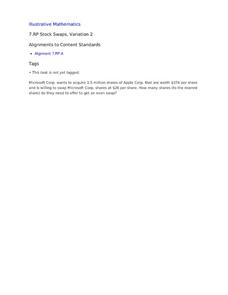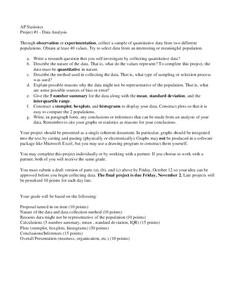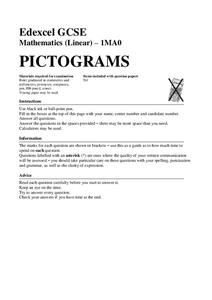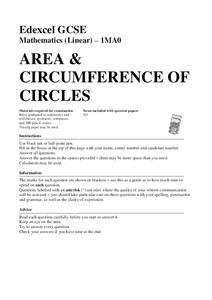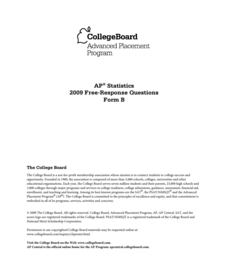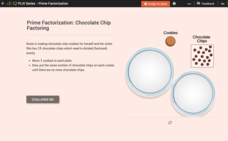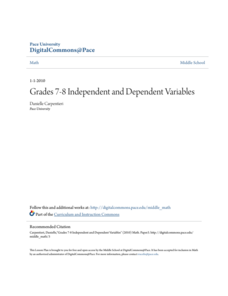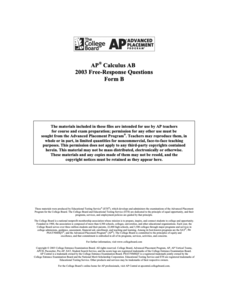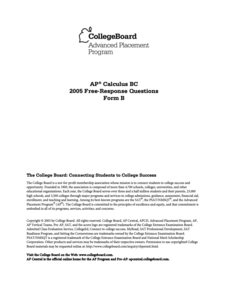Illustrative Mathematics
US Garbage, Version 1
An interesting example of a discrete function and how it is applies to the real world. This could easily make a good collaborative lesson with an environmental science class. Practice reading a table and drawing a scatter plot make up...
Illustrative Mathematics
Mile High
What is the meaning of sea level? This resource helps your class understand the meaning of elevations above, below, and at sea level. Provides for good discussion on using positive and negative numbers to represent quantities in the real...
Curated OER
Stock Swaps, Variation 2
If Microsoft wanted to take over Apple, how many shares would they need to break even? This is an ideal task for seventh graders who are studying proportional relationships and applying them to real-world scenarios. Use it as an...
Mathematics Vision Project
Module 8: Modeling Data
Statistics come front and center in this unit all about analyzing discrete data. Real-world situations yield data sets that the class then uses to tease out connections and conclusions. Beginning with the basic histogram and...
Fort Bend Independent School District
Data Analysis - AP Statistics
What better way to study survey design than to design your own survey! Bring a versatile data analysis project to your AP Statistics class, and encourage them to apply the practices from their instructions to a real-world survey project.
Mathed Up!
Pictograms
Young mathematicians read, interpret, and complete a variety of real-world pictograms. Each question includes a key and information to complete the graphs.
Mathematics Assessment Project
Estimating Length Using Scientific Notation
Would you rather have a million dollars or 1 x 10^6 dollars? To find the answer to this question, class members first complete an assessment task converting numbers between decimal notation and scientific notation. They then take part in...
Mathematics Assessment Project
Solving Linear Equations in Two Variables
Solving problems about pen and paper with systems of equations ... or is it the other way around? In the instructional activity, learners first interpret expressions and use equations in two variables to solve problems about notebooks...
University of Utah
Functions
Define, explore, compare, and analyze functions with the fourth chapter of a 10-part eighth-grade workbook series. After encountering the definition of a function, pupils begin to explore linear and nonlinear functions. They then work...
Balanced Assessment
A Loud Noise
In a scale measuring noise, an increase in 10 dB is a 10 time increase in power. Mathematicians examine the data graph of a real world exponential growth, with no logarithmic scale, and then create two equations relating the decibels and...
Mathed Up!
Area and Circumference of Circles
Don't go around and around, help your class determine amounts around and in a circle with a video that connects circumference to the perimeter or the distance around an object. The resource includes 14 questions dealing with circles and...
CK-12 Foundation
Inverse Variation Models: Speedometer for Inverse Variation Models
Model inverse variation while solving a real-world problem. Young scholars use the interactive lesson to discover the pattern of inverse variation data. They then use that discovery to write and analyze an equation.
02 x 02 Worksheets
Proportions
Cut-and-paste a great activity into your lesson plans. Scholars analyze real-world problems involving proportions. To change things up a bit they cut-and-paste quantities to create a proportion on their way to solving the problems.
CK-12 Foundation
Monomial Factors of Polynomials: Mystery Boxes
Shortcut the work in finding total volumes. Pupils determine a polynomial expression that would represent the combined volume of three boxes. Each box has the same height, and the scholars rewrite the expression by factoring out the...
Concord Consortium
Bricks for Books
Maximize a profit with an understanding of geometric dimension. A real-world task challenges learners to design a pattern using three different brick shapes. The bricks are dedicated with a different donation for each shape, so part of...
Concord Consortium
Dubious Dice
How many ways can you slice dice distribution? A short performance task asks pupils to consider different types of distributions. Given histograms showing a triangular distribution and a bimodal distribution, they create pairs of dice...
College Board
2009 AP® Statistics Free-Response Questions Form B
Is your class taking the AP® Statistics exam in the near future? You may want to take a look here. Using the 2009 AP® Statistics free-response questions Form B helps learners become familiar with the testing conditions, such as time...
CK-12 Foundation
Prime Factorization: Chocolate Chip Factoring
An interactive resource challenges mathematicians to show what they know about prime factorization. Five multiple-choice, true or false, and discussion questions use chocolate chip cookies to set a real-world application of the concept.
CK-12 Foundation
Fraction Comparison with Lowest Common Denominators: Oranges and Blood Oranges
Comparing fractions is the focus of a five-question interactive in which mathematicians use oranges to answer real-world multiple-choice, true or false, and discussion questions.
Pace University
Grades 7-8 Independent and Dependent Variables
It all depends upon the independence. The differentiated instruction lesson introduces learners to independent and dependent variables. Using real-world situations, scholars gain a conceptual understanding of the difference between the...
College Board
2003 AP® Calculus AB Free-Response Questions Form B
Get a better grasp of the intended content. The six free-response questions provide insight into the purpose of the AP® Calculus content. Two questions have real-world context while the remaining are void of context. The items range from...
College Board
2004 AP® Calculus AB Free-Response Questions Form B
The test is not all about skills. The six free-response questions contain two real-world application problems. Those items deal with populations and velocities. The other four questions ask pupils to show their knowledge of calculus...
College Board
2007 AP® Calculus AB Free-Response Questions Form B
What do the questions look like? Six free-response questions provide pupils with knowledge of how calculus topics appear on the AP® Calculus exam. The questions involve calculator and non-calculator problems by providing mathematical and...
College Board
2005 AP® Calculus BC Free-Response Questions Form B
Let's put it in context. Pupils use the AP® Calculus BC free-response questions to practice for the exam. Five of the six released items deal with mathematical problems, with one using a real-world situation. Learners use differentiation...
Other popular searches
- Math in Real World Context
- Math Real World Problems
- Math Real World Connection
- Math Real World Solving




